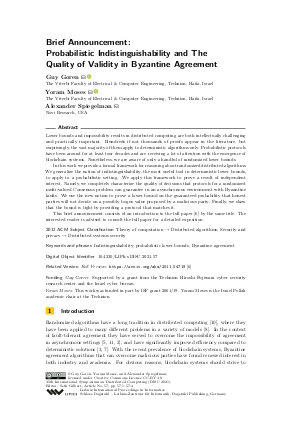Brief Announcement: Probabilistic Indistinguishability and The Quality of Validity in Byzantine Agreement
Authors
Guy Goren  ,
Yoram Moses
,
Yoram Moses  ,
Alexander Spiegelman
,
Alexander Spiegelman
-
Part of:
Volume:
35th International Symposium on Distributed Computing (DISC 2021)
Part of: Series: Leibniz International Proceedings in Informatics (LIPIcs)
Part of: Conference: International Symposium on Distributed Computing (DISC) - License:
 Creative Commons Attribution 4.0 International license
Creative Commons Attribution 4.0 International license
- Publication Date: 2021-10-04
File

PDF
LIPIcs.DISC.2021.57.pdf
- Filesize: 0.52 MB
- 4 pages
Document Identifiers
Related Versions
- Full Version https://arxiv.org/abs/2011.04719
Subject Classification
ACM Subject Classification
- Theory of computation → Distributed algorithms
- Security and privacy → Distributed systems security
Keywords
- Indistinguishability
- probabilistic lower bounds
- Byzantine agreement
Metrics
- Access Statistics
-
Total Accesses (updated on a weekly basis)
0Document
0Metadata
Abstract
Lower bounds and impossibility results in distributed computing are both intellectually challenging and practically important. Hundreds if not thousands of proofs appear in the literature, but surprisingly, the vast majority of them apply to deterministic algorithms only. Probabilistic protocols have been around for at least four decades and are receiving a lot of attention with the emergence of blockchain systems. Nonetheless, we are aware of only a handful of randomized lower bounds. In this work we provide a formal framework for reasoning about randomized distributed algorithms. We generalize the notion of indistinguishability, the most useful tool in deterministic lower bounds, to apply to a probabilistic setting. We apply this framework to prove a result of independent interest. Namely, we completely characterize the quality of decisions that protocols for a randomized multi-valued Consensus problem can guarantee in an asynchronous environment with Byzantine faults. We use the new notion to prove a lower bound on the guaranteed probability that honest parties will not decide on a possibly bogus value proposed by a malicious party. Finally, we show that the bound is tight by providing a protocol that matches it. This brief announcement consists of an introduction to the full paper [Guy Goren et al., 2020] by the same title. The interested reader is advised to consult the full paper for a detailed exposition.
Cite As Get BibTex
Guy Goren, Yoram Moses, and Alexander Spiegelman. Brief Announcement: Probabilistic Indistinguishability and The Quality of Validity in Byzantine Agreement. In 35th International Symposium on Distributed Computing (DISC 2021). Leibniz International Proceedings in Informatics (LIPIcs), Volume 209, pp. 57:1-57:4, Schloss Dagstuhl – Leibniz-Zentrum für Informatik (2021)
https://doi.org/10.4230/LIPIcs.DISC.2021.57
BibTex
@InProceedings{goren_et_al:LIPIcs.DISC.2021.57,
author = {Goren, Guy and Moses, Yoram and Spiegelman, Alexander},
title = {{Brief Announcement: Probabilistic Indistinguishability and The Quality of Validity in Byzantine Agreement}},
booktitle = {35th International Symposium on Distributed Computing (DISC 2021)},
pages = {57:1--57:4},
series = {Leibniz International Proceedings in Informatics (LIPIcs)},
ISBN = {978-3-95977-210-5},
ISSN = {1868-8969},
year = {2021},
volume = {209},
editor = {Gilbert, Seth},
publisher = {Schloss Dagstuhl -- Leibniz-Zentrum f{\"u}r Informatik},
address = {Dagstuhl, Germany},
URL = {https://drops.dagstuhl.de/entities/document/10.4230/LIPIcs.DISC.2021.57},
URN = {urn:nbn:de:0030-drops-148596},
doi = {10.4230/LIPIcs.DISC.2021.57},
annote = {Keywords: Indistinguishability, probabilistic lower bounds, Byzantine agreement}
}
Author Details
Funding
- Goren, Guy: Supported by a grant from the Technion Hiroshi Fujiwara cyber security research center and the Israel cyber bureau.
- Moses, Yoram: This work was funded in part by ISF grant 2061/19. Yoram Moses is the Israel Pollak academic chair at the Technion.
References
-
Hagit Attiya and Faith Ellen. Impossibility results for distributed computing. Synthesis Lectures on Distributed Computing Theory, 5(1):1-162, 2014.

-
Michael Ben-Or. Another advantage of free choice (extended abstract) completely asynchronous agreement protocols. In Proceedings of the second annual ACM symposium on Principles of distributed computing, pages 27-30, 1983.

-
Pesech Feldman and Silvio Micali. An optimal probabilistic protocol for synchronous byzantine agreement. SIAM Journal on Computing, 26(4):873-933, 1997.

-
Faith Fich and Eric Ruppert. Hundreds of impossibility results for distributed computing. Distributed computing, 16(2-3):121-163, 2003.

-
Michael J. Fischer, Nancy A. Lynch, and Michael S. Paterson. Impossibility of distributed consensus with one faulty process. JACM, 1985.

- Guy Goren, Yoram Moses, and Alexander Spiegelman. Probabilistic indistinguishability and the quality of validity in byzantine agreement, 2020. URL: http://arxiv.org/abs/2011.04719.
-
Jonathan Katz and Chiu-Yuen Koo. On expected constant-round protocols for byzantine agreement. In Annual International Cryptology Conference, pages 445-462. Springer, 2006.

-
Nancy A Lynch. Distributed algorithms. Elsevier, 1996.

-
Amir Pnueli. On the extremely fair treatment of probabilistic algorithms. In Proceedings of the fifteenth annual ACM symposium on Theory of computing, pages 278-290, 1983.

-
Michael O Rabin. Probabilistic algorithms in finite fields. SIAM Journal on computing, 9(2):273-280, 1980.

-
Michael O Rabin. Randomized byzantine generals. In 24th Annual Symposium on Foundations of Computer Science (sfcs 1983), pages 403-409. IEEE, 1983.

